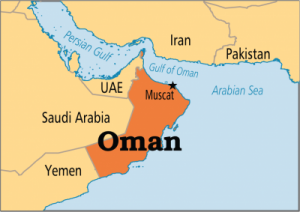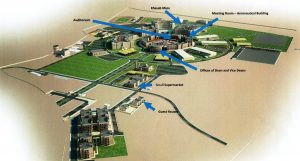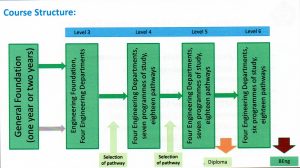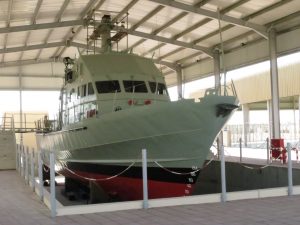- Author
- A.N. Other
- Subjects
- Uncategorized
- Tags
-
- RAN Ships
- None noted.
- Publication
- December 2018 edition of the Naval Historical Review (all rights reserved)
By Captain John McGrath RN, Rtd
The Sultanate of Oman occupies the strategically important south-eastern coast of the Arabian Sea at the mouth of the Persian Gulf. While it has modest oil reserves it has developed a diverse and vibrant economy. The country with an area of 309,500 km2, similar to the combined areas of Victoria and Tasmania, has a population of 4.5 million, the majority of whom are migrant workers. The local military forces of about 45,000 personnel are well trained and equipped. The Oman Military Technological College (MTC) which opened in 2014 is designed to accommodate over 2000 students. Student entry is currently limited to Omanis.
The author has been very fortunate to have visited this impressive facility twice. On the first visit he was part of a team from a number of Professional Engineering Institutes (PEIs) in the UK who were tasked with offering the College guidance on the steps necessary to achieve accreditation of their courses so that graduates would be qualified to register at the appropriate grade with the Engineering Council UK (EC). Three years later, again as part of a party composed of teams from six different PEIs, he represented the Institute of Marine Engineering, Science and Technology (IMarEST). As such, he focused on the offerings in Marine Engineering and this is the main topic of these notes.
The kind permission of the Dean of the MTC and the IMarEST has been granted for the publication of this article.
The College
The Maritime Technology College of Oman (MTC) is sited a short drive from Muscat International Airport. It was created following a directive by His Majesty Sultan Qaboos bin Saeed, Supreme Commander of the Armed Forces. The College’s vision is to be internationally positioned among the best of all-service providers of academic and technological education. Its mission is to deliver trade, specialist, undergraduate and post-graduate engineering programmes to all MoD service personnel in a well-equipped and high quality learning and training environment, resulting in the acquisition and application of knowledge and the achievement of operational competence and effectiveness at all levels.
The College was built on a dedicated site and covers a total area of approximately 1,000,000 m2with the buildings constituting approximately 270,000 m2.– see attached plan.

The College buildings were completed in less than two years and opened in 2013. It is built around a central open space suitable for a number of outdoor ceremonial and other activities, with the main administrative and teaching buildings arranged around its perimeter. Further out are the main workshop/hangar facilities, student accommodation and mess halls. The College also has a mosque, supermarket, sports fields, outdoor swimming pool and parking.
The ethos that the College seeks to promote is summed up by two inscriptions on the perimeter of the central space. The first is a motto ‘Knowledge and Perseverance’, and the other a reflection from His Majesty Sultan Qaboos bin Saeed, Supreme Commander of the Armed Forces.
Management of the College
Stakeholders are represented on the College’s Board of Directors, which is charged with the strategic governance and effectiveness of the College. The Main Board is chaired by Air Vice Marshal Matar bin Ali Al Obaidani and comprises senior officers from all three Omani Armed Forces. There are also civilian representatives from appropriate organisations including the Ministry of Higher Education, the Research Council and Sultan Qaboos University. The academic head of the College is the Dean, Professor Eugene Coyle, who reports directly to the Board to which he is accountable for the academic thrust, coherence and profile of the College. The Dean is assisted by two Vice-Deans; the Vice-Dean for Academic Affairs (VDAA) and Vice-Dean for Finance and Support (VDFS). The Director of Applied Research and the Director of Military Activities all report directly to the Dean. The Head of General Studies and English, and the four Engineering Heads of Department, report to the Dean through the Vice-Dean for Academic Affairs.


Academic offering
The output of the College is at two levels, a Diploma of Higher Education (DipHE) and a BEng. Honours Degree. All courses are taught in English. These qualifications are validated by the University of Portsmouth with which MTC has formed a very productive partnership. In particular it has enabled to College to put in place rigorous quality assurance (QA) processes that are tried and tested and which, in combination with its internal processes, the Oman Academic Accreditation Authority, the Oman MoD, the European Aviation Safety Agency and the PEIs from the UK all ensure that the courses are well structured, fit for purpose and properly delivered.
The College is divided into a number of departments that deal with the specific teaching and learning requirements of the main customer, together with other supportive/administrative departments. The four subject-related Departments are: Systems Engineering, Marine Engineering, Aeronautical Engineering and Civil Engineering. Each department teaches both a Diploma in Higher Education and a BEng. (Honours) degree, with students following a number of pathways within each discipline. The Marine Engineering specialisation has five pathways: Radar, Radio and Communications Engineering; Control Engineering; Electrical Engineering; Mechanical Engineering; Hull Engineering.
Students begin with a one-year or, if required, two-year General Foundation Programme (GFP) designed to increase the English language and military skills of the students. The academic content of the GFP consists of English, Mathematics, Physics, and Information and Communication Technology. Successful students then advance to a three-year programme. This starts with an Engineering Foundation Year and is followed by a two year DipHE. The highest achieving students are invited to continue with a further one-year of study leading to the BEng. (Hons) degree. Progression to the BEng. programme requires an average mark of 60% in every module undertaken in all the previous three years. There is no direct entry onto the BEng. Hons programme.

Modules consist of a combination of lectures, laboratories, workshops and reflective journal exercises. While lectures establish key concepts and develop the theoretical elements of a module, laboratories and workshops familiarise students with equipments and introduce them to the solving of practical problems and the generation of engineering solutions. They also provide practice in communication and presentation skills. The individual and group projects help students develop their analytical and critical skills.
Resources
MTC has recruited well-qualified, multi-national staff to deliver the programmes and that was no mean feat for an educational establishment with no prior academic record. Looking at the Layout Plan, the segments of the inner circle house the academic departments with their very well equipped lecture rooms and teaching laboratories. The visual aid equipment is state-of-the-art and the laboratories have modern experimental rigs and multiple computer stations. Also in this inner ring is the magnificent auditorium.
Workshops
Further out, there is a partial ring of large hangars and a covered ‘dry dock’. These hangars contain an impressive inventory of capital equipment and training workshops where students can acquire the essential practical skills for their future roles. Care has been taken to assemble this equipment; for instance, a Lear Jet was specifically procured so that employees of Oman Air could be trained at MTC.
Moving more specifically to the Marine Engineering Pathways, multiple sets of purpose designed training aids covers all the essential skills. The most impressive training aid for the marine engineering pathways is the training ship, a decommissioned warship transported to the College and installed under cover in a purpose-built ‘dry dock’. One MTU main engine and one diesel generator have been left on board, with the others installed in a hangar as training equipment.

Other equipment such as an Otto-Melara auto-cannon, a fire control radar and chaff dispensers are also located in the hangars. It should be emphasised that all the above are examples of a much more extensive inventory of training equipment.
Challenges
Among the many challenges which will be faced by the staff as MTC evolves to achieve its vision, two seem particularly important. The first is the need to maintain a funding stream to ensure that the impressive facilities with which the College began are maintained as state-of-the art and fit-for-purpose as they were when the College started out. The other is the development of an active research base. This will be essential if MTC is to progress to the delivery of Master’s level courses and is highly desirable for the BEng. degrees. For both levels of course, one spin-off from research programmes will be the generation of a spectrum of relevant projects for students to tackle and another will be direct feed into lecture content. Students are always enthused when they can see the relevance of the project work that they are undertaking to their future careers. From speaking with the naval members of the college’s Industrial Advisory Board, it is clear that they are both able and willing to bring forward suitable matters for investigation and that they can see what a valuable resource the College will provide in support of the naval service. It seems highly likely that the other services will adopt a similar attitude. Another advantage of a research programme is that external funding can be sought and this, in turn, could help with the development of the equipment inventory, thus partially addressing the first of these challenges.
Outcome
The author can only report on the outcome of the accreditation visit from the perspective of the IMarEST. It is a real pleasure to be able to report that at the meeting of the Institute’s Professional Affairs and Education Committee held on 3 May 2018, it was decided to grant the courses offered in the five Marine Engineering pathways the following accreditations:
BEng. (Hons) Marine Engineering
Accreditation of the above course as meeting the academic requirements, in full, for registration as an Incorporated Engineer and Incorporated Marine Engineer.
DipHE Marine Engineering
Accreditation of the above course as meeting the academic requirements, in full, for registration as a Marine Engineering Technician.
Accreditation of the above course as meeting the academic requirements, in part, for registration as an Incorporated Engineer and Incorporated Marine Engineer.
Acknowledgements:
The author wishes to thank MTC most warmly for its generous hospitality during both visits and for the open and constructive way in which all discussions with the panel members from the IMarEST were conducted. He also wishes to acknowledge the contribution of Professor Eugene Coyle, the Dean of the College, for checking the accuracy of the above notes and for permitting their publication. Captain David Smith, Royal Fleet Auxiliary, and Mr Tom Fanthorpe of IMarEST are thanked for checking that nothing has been said with which they disagree, and the author is grateful to the IMarEST for allowing the publication of this article.




